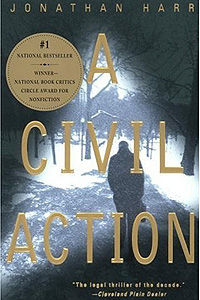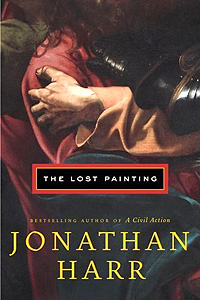Author Harr discusses his creative process for writing nonfiction that rivals any novel
By Josh Schonwaldjschonwa@uchicago.edu
News Office
| |||
It had the ingredients of a potential snoozer—a nearly 500-page tome that featured a battery of plaintiff’s attorneys, an arcane epidemiological study, a lengthy tract on groundwater contamination and an exhaustive, law school-like examination of an appeals court process.
Yet after A Civil Action appeared in 1995, reviewers saluted it as a “page-turner,” “gripping,” “riveting” and “hard to put down.” One critic even suggested that the book could cause sleeping problems.
This skill, the ability to transform the dry details of a protracted legal battle into high drama, is a major reason that Jonathan Harr received an invitation to Chicago this year as the Robert Vare Nonfiction Writer-in-Residence.
“A Civil Action was a triumph not just for Jonathan, but for the whole genre of narrative nonfiction,” said Robert Vare (A.B.,’67, A.M.’70), founder of the eight-year old nonfiction writer-in-residence program. “It shows that readers will respond to true stories that are well-told, no matter how difficult or challenging their subject matter.”
 A Civil Action | |
Indeed, Harr’s book, which tells the story of a wrongful death lawsuit filed by eight families in Woburn, Mass., is one of the era’s most successful nonfiction books, both critically and commercially. It won numerous honors, sold more than two million copies, was bought by Robert Redford for $1.25 million and turned into a major Hollywood movie starring John Travolta and Robert Duvall.
What’s extraordinary about A Civil Action, and the reason that Vare includes it among the canon of great nonfiction literature, is its novelistic style. Like other celebrated nonfiction books, such as John Hersey’s Hiroshima, Tracy Kidder’s The Soul of a New Machine and Tom Wolfe’s The Right Stuff, A Civil Action is virtually indistinguishable from the best fiction in its pacing, powerful scenes and unforgettable cast of characters.
The book’s protagonist, the maverick, Porsche-driving, personal-injury lawyer Jan Schlichtmann is portrayed as an outsized character imbued with a novel’s full range of qualities—charm, brains and self-destructive impulses. And the book artfully shifts point of view, as in classic works of fiction, burrowing into the thoughts and emotions of Schlichtmann and his opponents. “It’s like Jonathan set up camp in each of his character’s minds,” Vare said.
Though he is best known for A Civil Action, Harr has written for such magazines as The New Yorker and The New York Times Magazine. He also wrote a second best-seller, The Lost Painting, which tracks the investigation of a lost Caravaggio that turns up unexpectedly in a Dublin monastery.
 The Lost Painting | |
Vare brought Harr to Chicago this spring in the hopes that he would impart some of his experiences and trade secrets to College students. The eighth Vare writer-in-residence, Harr joins a long line of esteemed nonfiction writers, such as Ron Rosenbaum, Simon Winchester and David Hajdu, who each spent one academic quarter conducting writing workshops at Chicago.
Bringing Harr, a former Hyde Park resident, back to Chicago has been a goal of Vare’s since he created the nonfiction writing program. An editor-at-large at The Atlantic and the editor of the recently published The American Idea: The Best of The Atlantic Monthly; 150 Years of Writers and Thinkers Who Shaped Our History, Vare worked with Harr at The New Yorker and The New York Times Magazine in the 1990s. Vare recalls being deeply impressed not only by Harr’s exceptional storytelling abilities—“he seems to have a natural gift for story, knowing when to heighten, when to break away, when to use comedy”—but also for his passionate dedication to accuracy.
Harr, who worked more than two years on each of the articles he wrote under Vare, spent more than eight years on A Civil Action, poring over mountains of depositions and transcripts, which stacked together, ran 27 feet high. He also took four years to finish The Lost Painting, in part, because, in order to get more perspective on and insight into his subjects, he became fluent in Italian and immersed himself in the culture of Renaissance Italy.
“He’s no David Remnick,” said Vare, referring to the famously speedy New Yorker editor. “But he’s able to tell such amazing stories within the boundaries of fact because of the intensity of his reporting. He’s meticulous about every fact. He’s always been at the top of my list of the type of person I wanted to bring to this campus.”
To hear about Harr's notoriously meticulous research process, his thoughts on the future of narrative nonfiction and how Sherlock Holmes and a fifth-grade teacher at Hyde Park’s Bret Harte School helped shape his writing and storytelling style, please listen to excerpts from the Chronicle's audio interview with Harr.
Ten Questions: Jonathan Harr
1. Harr recalls his origins as a writer/journalist - which began right here in Hyde Park as a 5th grader at the Bret Harte school.
| Listen to Audio: |
2. Harr's career trajectory is different from many of his peers - he never took a formal creative writing class. Here, Harr talks about his journey, from college drop-out to VISTA volunteer in West Virginia to a New York City cab driver/aspiring novelist.
| Listen to Audio: |
3. Harr started his career as a wannabe novelist but quickly moved to nonfiction. He talks about his transition from fiction to journalism, his first experiences with longer form nonfiction as a writer for a New Haven alternative weekly, and his stint at the late New England Monthly, a magazine which launched the careers of several talented nonfiction authors.
| Listen to Audio: |
4. In one of his first classes, Harr told his students that he's very selective about who reads drafts of his work; in fact, he seeks feedback from only one person: Tracy Kidder. Kidder, one of Harr's closest friends, is also the same person who helped Harr begin his first book, A Civil Action. Here, Harr talks about the surprising bar room origins of his friendship with the Pulitzer prize winning author of The Soul of a New Machine, House, and Mountains Beyond Mountains.
| Listen to Audio: |
5. Harr talks about coming up with story ideas, the ingredients he looks for in a nonfiction story, why he prefers stories that have multiple characters and why the level of access he needs is so different from that of a conventional journalist.
| Listen to Audio: |
6. One of the most important parts of Harr's work is negotiating access to his subjects. Here, he talks about the lengthy process of gaining the trust of characters -- on both sides of the courtroom -- in a A Civil Action, and the techniques he uses when he isn't granted access.
| Listen to Audio: |
7. How does a nonfiction author create a "page turner"? Harr talks about the importance of maintaining a suspenseful narrative, why there is no formula for creating suspense in nonfiction, and the type of feedback he most likes from his readers..
| Listen to Audio: |
8. Harr talks about some of the writers and books that influenced his storytelling approach. He also talks about how his early love for Sir Arthur Conan Doyle's Sherlock Holmes novels unconsciously shaped his writing.
| Listen to Audio: |
9. Harr talks about his class “The Craft of Narrative Nonfiction,” why his experience at Chicago was much different from an earlier teaching stint at Smith College, and why he’s still not sure that writing is something that can be taught.
| Listen to Audio: |
10. Harr talks about the future of the genre of narrative nonfiction, his personal goals for the future, and why he wants to give fiction another try.
| Listen to Audio: |
![[Chronicle]](/images/sidebar_header_oct06.gif)
